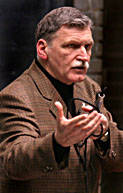While the world watched
Former peacekeeper Roméo Dallaire remembers Rwanda
In 1994, during the Rwandan genocide and civil war, a young sergeant and a platoon of soldiers enter a village. Corpses are lying everywhere. As they survey the carnage around them, survivors begin to pour out of the local church.

Former Canadian Lieutenant-General Roméo Dallaire
Owen Egan
At the edge of the village the sergeant spots a group of boys, aged 9 to 15 years, carrying light machine guns. From the other side, another group of armed boys advance on his troops. They are using young girls — some of them pregnant — as human shields. Both groups of children open fire on the troops and the survivors from the church.
What does the sergeant do?
"There is a corporal who can hear even today, with digital clarity, and in slow motion, the order from the sergeant to fire. He can feel his trigger finger tightening, hear the report of his weapon, feel the recoil of the rifle — and through his sight he can see the head of a child explode."
Roméo Dallaire pulled no punches in his speech to a packed house at McGill on November 17. The former Canadian Lieutenant-General was in charge of the UN peacekeeping mission to Rwanda in 1994. He had been in the African country for scant months before a civil war broke out, with an accompanying genocide that saw the systematic and brutal murder of about 800,000 people. Most were Tutsis and moderate Hutus.
It was the most dramatic failure of a UN mission ever. Despite his pleas for more men and material — which came with ample warning of what was in store for the country — Dallaire was ignored both by the UN headquarters and the world at large, even after the slaughter started. He said his just-published memoir, Shake Hands With the Devil, is an attempt to speak from the heart about the atrocities he saw, and how they may be prevented again.
"It attempts to engage you in discussion, and that discussion is based on the question, are some humans more 'human' than others?" he said.
When the Rwanda massacre began there were 16 UN missions going on. Some were huge, such as those in Cambodia and Yugoslavia. They received millions of dollars of aid and manpower.
"Rwanda was not one of them. It had to be done on the cheap, it had to be done in two years, and it had to be a success," he said.
In the wake of Somalia, where the U.S. lost several troops in an incident dramatized in the book and movie Black Hawk Down, Western powers were leery about becoming involved in African conflicts.
Dallaire pointed out that in Yugoslavia, where the conflict was European and between white antagonists, there was all the will in the world to end the fighting, which was often described as the result of ancient resentments left over from the Ottoman Empire.
"At the same time, black Africans killing each other didn't count. And you'd hear arguments in the corridors saying that this is their tradition, to kill women and children and the elderly," he said.
The truth of the matter is the ethnic tensions in Rwanda were a direct result of the European colonial regimes, which exploited, and in some cases created, ethnic divisions. It was Europeans who introduced identity cards that marked their bearer as either Tutsi or Hutu.
"These were tickets to be slaughtered," said Dallaire.
Although the UN failed spectacularly in Rwanda, it is the only body that could possibly have the credibility — or the lack of self-interest — to intervene in the kinds of non-war conflicts that have marked the decade since the end of the Cold War. But Dallaire believes to do so will require a fundamental rethinking of our diplomatic and military mindset, because we certainly have no idea what we're doing now.
"We've been 'ad hoc-ing' it; we've been doing on the job training, and crisis management," he said.
"We don't have the skill sets to deal with these complex, multidisciplinary problems. And we're making it worse."
Making it better will require sacrifices, and better education for the men and women we send into zones of conflict, said Dallaire. You cannot stop a Rwanda unless you are prepared to send troops that are willing to risk, and perhaps even lose, their lives. And as the story of the sergeant in the village illustrates, those troops will have to face situations that could not be imagined in a classic war scenario.
Western nations like the U.S. in Somalia and Belgium (who lost 10 soldiers in the first 24 hours of the Rwandan slaughter) cannot stomach the loss of their troops — even when thousands of lives can be saved in the process. It only shows that in the end, we do value some lives more than others, and that is a betrayal of what we should believe in.
"How deep is our commitment to the humanity of the developed nations?" he asked.
"We do not believe our blood should be spilled even as we are drowning in the blood of the developing nations."
During the question period after his talk, one man stood up to thank Dallaire for his work in Rwanda, which drew a round of applause from the audience. Jean-Paul Nyirinkwaya left Rwanda for Canada in 1994.
"There are so many people who just talk, but he has put action where his words are," said Nyirinkwaya afterwards.
"He's been there."
Roméo Dallaire's talk was sponsored by the McGill Institute for the Study of Canada. His book, Shake Hands With the Devil (Random House Of Canada), is available at the McGill Bookstore.
Parents et Amis des Victimes du Génocide au Rwanda is planning commemorative events for the 10th anniversary of the killings. For more information, see www.page-rwanda.org.
